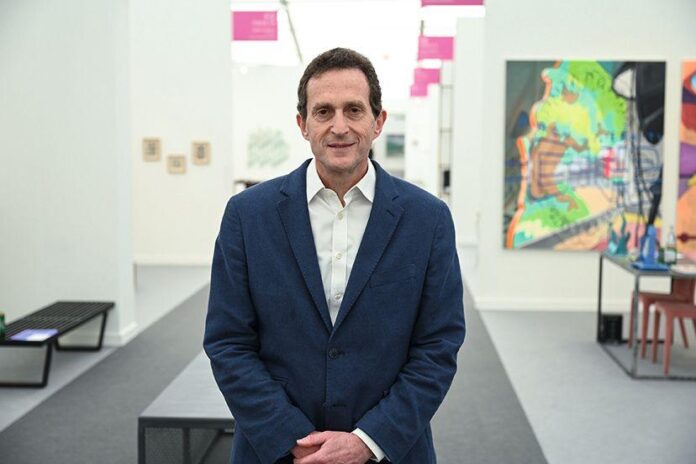”We are fighting to ensure London—and the UK—remains front and centre in the global art world,” says Simon Fox, who was appointed the chief executive of Frieze in January 2020, two months before the pandemic hit. Since then he has had a lot to contend with: the fallout from Brexit, a cost-of-living-crisis and the Tory government’s downgrading of the arts, to name a few.
Nonetheless, in the fair the mood is buoyant. “We have more diverse, inclusive communities than anywhere in Europe and our art schools are absolutely second to none. Our art market is twice as big as the French market and we have wonderful institutions whose current shows are the best they’ve ever been,” Fox says.
Frieze may have started as a particularly British affair, launched by magazine publishers Amanda Sharp and Matthew Slotover in 2003, riding on the coat tails of the YBAs and the opening of Tate Modern in 2000, but it has fast become a global powerhouse with fairs in New York, Los Angeles and, most recently, Seoul.
Financially backed by its owner, the Los Angeles-based sports and entertainment conglomerate Endeavor, this summer Frieze acquired the Armory Show in New York and Expo Chicago. Fox says that, with the US accounting for 45% of the global art market, “it makes sense for us to play a bigger part there”. He notes a distinct difference between Frieze New York (“smaller, more global”) and The Armory Show (“very embedded in the New York art scene and community”) and says the “intention is to keep those two brands very separate”.
Nonetheless, change could be on the horizon. There are rumours that Frieze is looking at venues in New York other than The Shed that can accommodate more exhibitors; Fox says all of his fairs are “oversubscribed”. So would Frieze merge The Armory and its existing New York fair? “That’s not something I would want to speculate on at this point,” Fox says.
Another piece of the puzzle is the scheduling clash between The Armory and Frieze Seoul, which launched in September two years ago. Fox thinks they can coexist—for now. “At some point we will be able to adjust the scheduling, but it’s not going to be for a number of years,” he says.
When Endeavor acquired a 70% stake in Frieze in 2016, its president Mark Shapiro said there were plans to “festivalise” the art fair. Those ideas may not have materialised, but Endeavor’s support has enabled the business to expand considerably. “It’s not their intention to put a stamp on our brand,” Fox says. “We get great back office support from Endeavor, but they leave us to run our business.”
Art Basel had a similar boost in 2020 when another media scion, James Murdoch, the son of Rupert Murdoch, injected €46m into the fair’s parent company MCH, becoming a board member and anchor shareholder. Two years later, Art Basel launched Paris+ par Art Basel, a fair that is perceived to be in direct competition with Frieze London (the French event is held directly after).
As for the art fair duopoly with Art Basel, Fox thinks Frieze is already at the level of the Swiss conglomerate. “We’re very different, we don’t compare ourselves,” he says. “But we certainly think that we are a—if not the—pre-eminent brand in the art world. And that’s where we want to stay.”

























